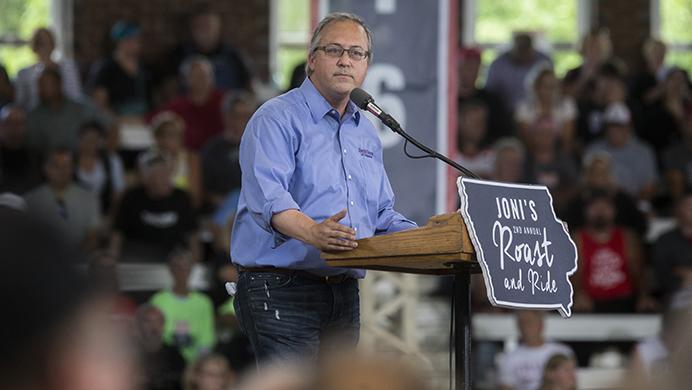A recently enacted law sponsored by Iowa’s David Young is designed to protect the country, specifically farm states such as Iowa, from threats to agricultural security.
By Molly Hunter
President Trump signed a piece of legislation on June 30 sponsored by Rep. David Young, R-Iowa, aimed at improving the security of the nation’s agriculture and food-distribution industry.
The Securing Our Agriculture and Food Act, which passed in the U.S. House on June 19, is meant to address concerns that arose in the wake of Iowa’s 2015 avian-influenza outbreak.
“Response efforts revealed problematic breaks in the federal government’s ability to communicate with stakeholders and react quickly to large-scale animal-disease outbreaks,” said a June 20 press release provided by Young’s office.
Jim Roth, the director of the Center for Food Security and Public Health, said Iowa’s economy lost more than $1 billion because of the outbreak, which shut down poultry exports from the Upper Midwest.
“The diseases we don’t have that would be economically devastating, besides avian influenza, are foot-and-mouth disease, which affects all cloven-hoofed animals — cattle, swine, sheep, goats, deer; classical swine fever, which affects only pigs; and African swine fever, which affects only pigs,” Roth said.
Although none of those diseases pose risks to public health or food safety, any of them would have serious impacts on foreign agricultural trade, he said.
“The World Organization for Animal Health and the World Trade Organization say that any country that has any of those three diseases can’t export its beef or pork,” Roth said.
In that area, he said, Iowa has more to lose than any other state.
“We export about 25 percent of the pork from the U.S. and about 15 percent of the beef,” he said. “So we would lose those export markets and the price of beef and pork would drop dramatically. And the price of corn and soybeans would drop dramatically because we wouldn’t be producing as many pigs and cattle.”
A June 22 press release from Young’s office said the law will require the U.S. Departments of Homeland Security, Agriculture, and Health and Human Services to collaborate “to ensure food, agriculture, and animal- and human-health sectors receive attention and are integrated into the [Homeland Security] domestic-preparedness policy initiatives.”
In the past, Roth said, agriculture has been low on Homeland Security’s list of priorities.
“Homeland Security [tends] to spend more time on border controls, and immigration, and other aspects of security — chemical accidents, nuclear accidents, nuclear terrorism, chemical terrorism,” Roth said. “It’s important to remind them that agriculture is within their sphere of responsibility, and they need to pay close attention to it.”
John Benson, a spokesman for the Iowa Department of Homeland Security and Emergency Management, said an animal-disease emergency is not something the department expects to see frequently.
However, he said, Homeland Security is certainly invested in Iowa’s agricultural welfare.
“With agriculture being one of the prime economic drivers in the state, one of our missions is to ensure that the economy of the state is able to respond to something like that and can recover quickly from something like that,” Benson said.



